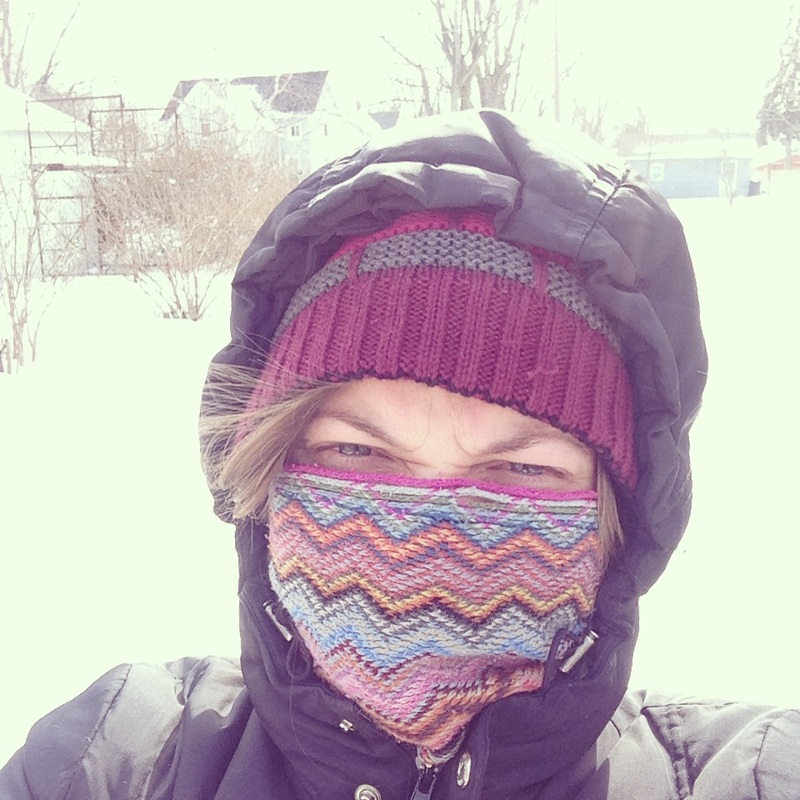Yesterday, I woke up to falling snow. It kept going all day. My uncle came over twice from across town with his snowblower to clear the driveway. It was 6 F (-14 C) then. He said the snow was a good thing. It would insulate the ground from the cold and hopefully pipes wouldn’t burst. My dad started clearing out the garage which he had been using as a work space to refinish some wood from our nearly-100 year old house. He got enough cleared out to put one of the two family cars inside.
At 5pm, when it was 3 F (-16 C), I went with my dad to fill up the gas tanks of both cars. My uncle had told him the gas station, which is usually open 24 hours would close at 6, so we had to get in just under the wire. As we slowly drove the ½ mile home, fishtailing all the way, we avoided any streets where there was even a glimmer of headlights. We passed a man walking home from the store and offered him a ride but we were too late. He was only a half block from his home. We got home and cracked open a bottle of wine, happy the power was still functioning and both cable tv and internet were fine. My uncle posted on facebook “Snow blower - check. Generator with extra gas - check. Food stashed - check. Fireplace on -check. Chili for dinner - check. Board games - check. Whiskey- check. Bring on the 10 inches of snow and -30!”
When I woke up this morning my smartphone told me it was -17 F (-27 C). I scrolled through facebook. A former professor in Chicago quoted a pedestrian interviewed by a news crew: “The 1st 10 minutes, you think, 'it's not so bad.' The next 10 minutes, your face starts to burn. Then, you start to ask, 'Why did I ever decide to live in Chicago?” A friend from high school warned that highway plow crews had given up. They would do one last round looking for stranded drivers then head home. Several people announced closings or asked about specific companies. The insurance company that has its corporate headquarters in “the big city” of 100,000 that is 10 miles away was closed for the day. The candy factory and car manufacturing plant were not. Another high school friend posted a video of himself throwing a bucket of water into the cold air and it instantly turning to snow. The local restaurant announced it would not be open for breakfast but hoped to open at 11 for lunch with vegetable soup and turkey sandwiches for the daily special.
I decided, mostly based on the pedestrian’s comments on the news, that this was probably my only chance in my life to experience temperatures so cold and I should probably go out. I pulled on long johns, 2 pairs of socks, my flannel pajamas, courduroy overalls, my Bolivian alpaca sweater, my coat that resembles a sleeping bag with a hood, a hat, a scarf, two pairs of gloves, snowboots, and sunglasses. I set the timer on my phone to see how long it would be enjoyable. I walked to the side yard and took a selfie. I went around the perimeter of the yard. My torso was still toasty, but my eyes were watering and my legs between the top of my boots and the bottom of my coat were chilly. I went inside and found it had been 3 ½ minutes. Not bad, I thought.
In essence, on this day that felt so unusual, people used Facebook, not only to strengthen the sense of community one experiences in a “crisis,” but also to record their experiences. In many ways, writing about your stockpile of resources, quoting commentary on the news, and even offering delivery of products from “town,” are a way of performing and remembering this somewhat exciting experience. It first a performance of collegiality, sharing the moment with those who are also experiencing it, but not physically present with you. With no one wanting to go outside, and the street unnavigatable for cars, most people were rather solitary at home. Yet Facebook provided a way to understand the extreme cold as something collectively lived. But at the same time, people were performing for themselves. They were capturing their memories of the day in small snippets, putting on public record in order to remember their first thoughts as -17F air hit their exposed face, what they felt was important to keep handy, and the way they helped their neighbors on a supply run to “town.” Facebook served as a repository of experience that was simultaneously personal and collective. And as such, is an important way of making memory.

 RSS Feed
RSS Feed
